Cyber Security SEO Tactics That Actually Work in 2025

In today’s digital world, ranking high on search engines is crucial for cybersecurity firms. With Google’s algorithms becoming smarter, standing out requires more than just keywords—it requires authority and trust.
As SEO experts specializing in the cybersecurity niche, we understand the unique challenges involved. Our proven strategies focus on optimizing content, building authoritative backlinks, and following the latest Cyber Security SEO trends to ensure your business ranks effectively while building trust with your audience.
In this blog, we’ll share actionable SEO tactics tailored for cybersecurity firms in 2025 to help you boost visibility and credibility.
Key Highlights:
- Creating white-hat, educational content around CVE reports, exploit breakdowns, and breach trends boosts cybersecurity websites’ authority and search visibility.
- Actionable strategies like AI-powered threat simulation pages, SaaS product feature SEO, and topic clusters around frameworks like NIST and MITRE increase topical relevance and qualified traffic.
- Tools like SEMrush, Ahrefs, and Cloudflare help monitor backlinks, detect malware threats, and enhance website security while improving SEO performance.
What is Cyber Security SEO?
Cyber Security SEO combines cybersecurity practices with SEO strategies to make sure your website is both secure and optimized for search engines. It’s about creating a safe environment for both your site and its users, while also helping your site rank higher in search results.
Key Aspects of Cyber Security SEO:
- SSL Certificates & HTTPS: SSL certificates encrypt the connection between your site and users, ensuring privacy. HTTPS is a ranking factor for Google, but it also builds trust with visitors by securing their data.
- Protection Against SEO Spam Attacks: Cybercriminals often use spammy backlinks, fake reviews, and other tricks to hurt your site’s SEO. Cybersecurity measures help detect and prevent these attacks.
- Secure Hosting & Firewalls: Reliable hosting services that include firewalls and other security features are essential. They prevent hacking attempts and minimize security risks that could impact your site’s performance.
- Preventing Malware: Malware can not only harm your website’s reputation but also trigger penalties that affect SEO. Cybersecurity measures work to ensure your site is free from malware and harmful code.
- Avoiding Google Penalties: Google can penalize compromised websites, which leads to a drop in rankings. Ensuring that your site is secure from hacking attempts reduces the risk of these penalties, keeping your site’s SEO intact.
SEO for Cyber Security is all about strengthening website security while boosting SEO performance. For further insights on how technical SEO supports security, check out our guide on fixing common security-related issues in Google Search Console (like the “blocked due to unauthorized request” error).
Now that we’ve understood the fundamentals of Cyber Security SEO, let’s dive into some of the most powerful strategies that will ensure your website remains both secure and authoritative this year.
Effective Cyber Security SEO Strategies for 2025
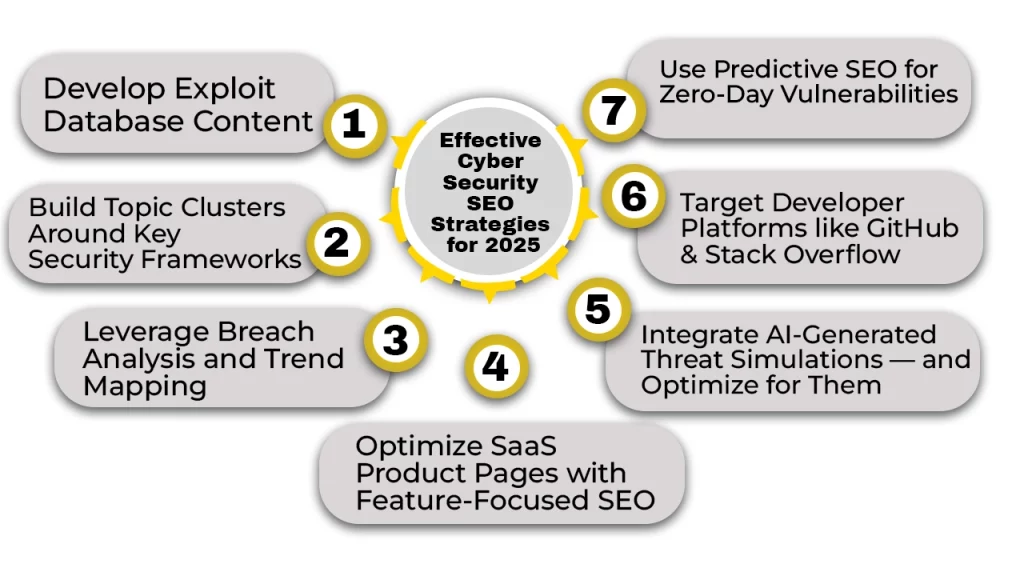
1. Develop Exploit Database Content — Without Going Black Hat
One of the most impactful ways to enhance Cyber Security SEO is by creating educational content around known vulnerabilities, exploit breakdowns, and CVE (Common Vulnerabilities and Exposures) reports.
Why It Works:
These search terms are highly relevant to IT professionals, analysts, and cybersecurity students — yet very few companies create well-structured, white-hat content around them.
Pro Tip: Publish focused articles like:
- “CVE-2025-XXXX Explained: Impact, Mitigation & Patch Notes”
Be sure to incorporate:
- FAQ schema
- Code examples
- Step-by-step patching instructions
2. Build Topic Clusters Around Key Security Frameworks
Move beyond general keyword targeting and establish thematic content clusters based on widely recognized frameworks such as:
- NIST Cybersecurity Framework
- ISO/IEC 27001
- Zero Trust Architecture
- MITRE ATT&CK Matrix
Each framework opens the door to long-tail keyword opportunities and deeper content exploration.
Cyber Security SEO Bonus:
Google rewards structured topic clusters with higher topical authority, leading to increased user engagement and improved search rankings.
3. Leverage Breach Analysis and Trend Mapping
Your cybersecurity content strategy should not only be educational — it must also be timely and insight-driven. Create ongoing blogs or data reports that analyze:
- Recent, high-profile data breaches
- Quarterly phishing trend breakdowns
- Industry-specific malware vectors
Use Tools Like:
- Google Trends
- Have I Been Pwned
- Dark web monitoring platforms
Such content is more likely to be shared by analysts, featured by media outlets, and referenced across industry forums.
4. Optimize SaaS Security Product Pages with Feature-Focused SEO
If your organization provides cybersecurity tools or SaaS products, avoid competing on overused terms like “endpoint protection software” or “firewall tool.”
Instead, focus on user-specific needs and technical differentiators, such as:
- “Email encryption with zero-knowledge architecture”
- “Malware sandbox with real-time visualization”
- “Cloud DLP for HIPAA-compliant healthcare environments”
SEO Benefit:
These targeted phrases not only reduce competition but also attract more qualified, solution-aware buyers.
5. Integrate AI-Generated Threat Simulations — and Optimize for Them
As AI-driven threat simulation becomes a standard offering in cybersecurity, capitalize on the opportunity by creating SEO-optimized landing pages and visual content.
Examples of Content Focus:
- “Phishing simulation for startups”
- “AI-powered ransomware testing tools”
Add visual elements like demo videos or GIFs and write real-world use cases showing pre- and post-simulation results.
Cyber Security SEO Boost:
This approach resonates with both enterprise stakeholders and cybersecurity journalists, increasing backlinks and brand visibility.
6. Target Developer Platforms like GitHub & Stack Overflow
Think beyond Google. A large portion of your technical audience spends time on GitHub, Stack Overflow, and Reddit.
Tactical Ideas:
- Build and share open-source cybersecurity scripts
- Optimize GitHub README.md files with relevant keywords
- Link to blog tutorials or tool documentation from GitHub and Stack Overflow answers
This strategy enhances topical authority, generates backlinks, and drives high-intent developer traffic.
7. Use Predictive SEO for Zero-Day Vulnerabilities
Don’t wait for trends to become mainstream. By monitoring cybersecurity chatter, you can publish content around vulnerabilities before they spike in search volume.
Tools for Early Trend Detection:
- Twitter API with cybersecurity filters
- ExploitDB and CVE monitoring tools
- Google Alerts and AI-driven RSS feeds
By being first to publish, you can dominate SERPs for emerging threats and gain a competitive SEO edge.
Challenges in Implementing Cyber Security SEO
- Balancing Security with Site Speed: While security features like SSL certificates and firewalls are crucial, they may impact site speed. Slow websites can frustrate users and harm SEO, so finding a balance is key.
- Recovering from Google Penalties: If your site is hacked, regaining trust with Google and recovering rankings can take time. Penalties can cause a significant drop in visibility, requiring effort to rebuild authority.
- Staying Ahead of Evolving Cyber Threats: Cybersecurity threats change rapidly. You need to continuously update your website’s security while keeping SEO strategies effective in the face of new vulnerabilities.
- Meeting Security Compliance Standards: Compliance with industry standards such as GDPR, HIPAA, or PCI DSS is essential but can sometimes clash with SEO strategies. Striking the right balance requires thoughtful planning.
- Managing Toxic Backlinks: Negative SEO campaigns often involve harmful backlinks, which can damage your rankings. Ongoing monitoring and removal of these toxic links is vital for maintaining SEO health.
Essential Cyber Security SEO Tools
Utilizing the right tools is crucial for effective SEO for Cyber Security. Tools that monitor backlinks, detect malware, and track website performance are essential to maintaining both security and SEO rankings. Our SEO services incorporate advanced tools to optimize your website’s security and performance, ensuring you stay ahead of any potential threats.
Here are some powerful tools that can help optimize both the security and SEO aspects of your website:
1. SEMrush
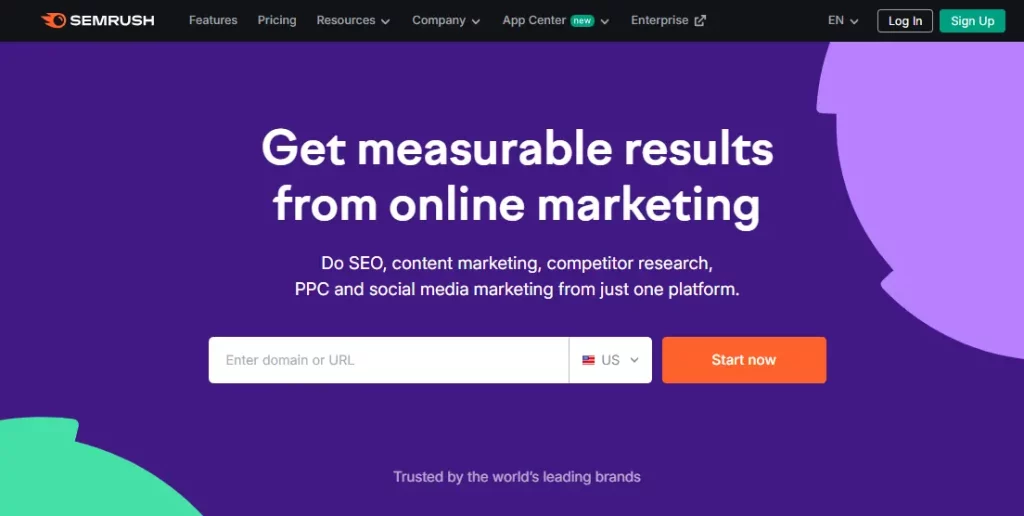
SEMrush is a comprehensive SEO tool that can help you with keyword research, backlink analysis, and competitor research. In the context of SEO for cybersecurity, you can use SEMrush to monitor website traffic and identify vulnerabilities related to your SEO performance. It also provides information about how well your site is ranking for security-related keywords.
2. Ahrefs
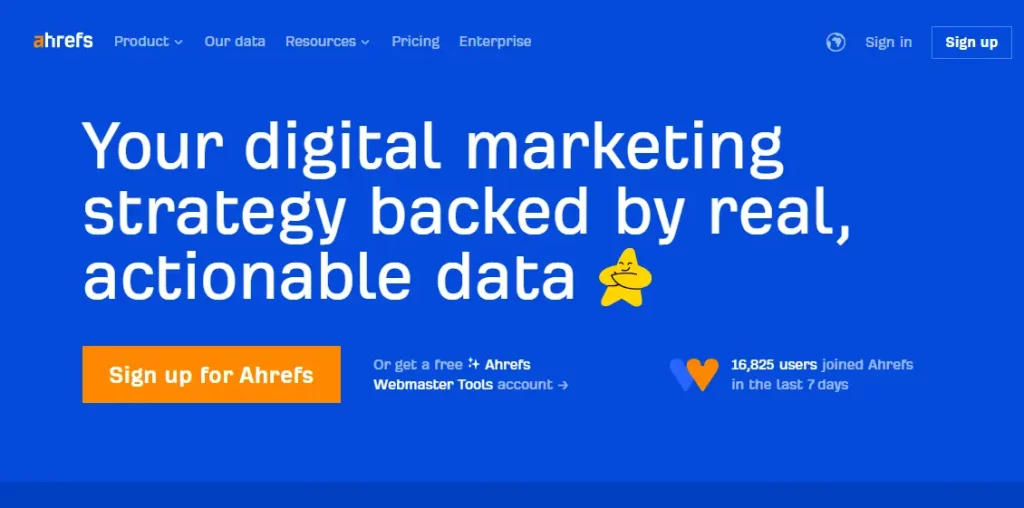
Ahrefs is an excellent tool for backlink analysis and link building. It helps you identify toxic backlinks, which can harm your website’s SEO. For cybersecurity SEO, Ahrefs also lets you monitor how your competitors are performing in terms of backlinks and SEO tactics, which can inform your strategy.
3. Google Search Console (GSC)
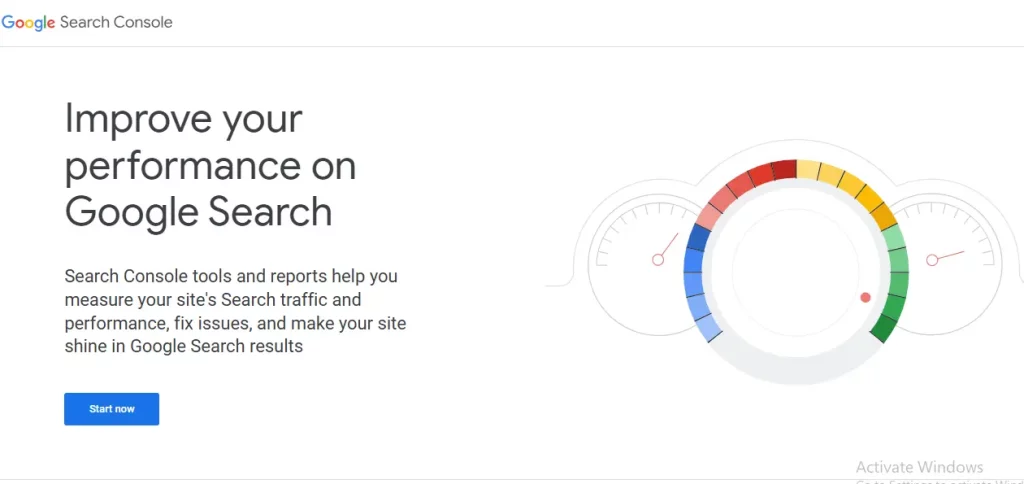
Google Search Console is a critical tool for detecting and resolving security issues that may impact your SEO. GSC allows you to track website health, identify hacking attempts, and fix issues such as malware or malicious content. It also provides valuable insights on how Google crawls and indexes your website.
4. Google Analytics
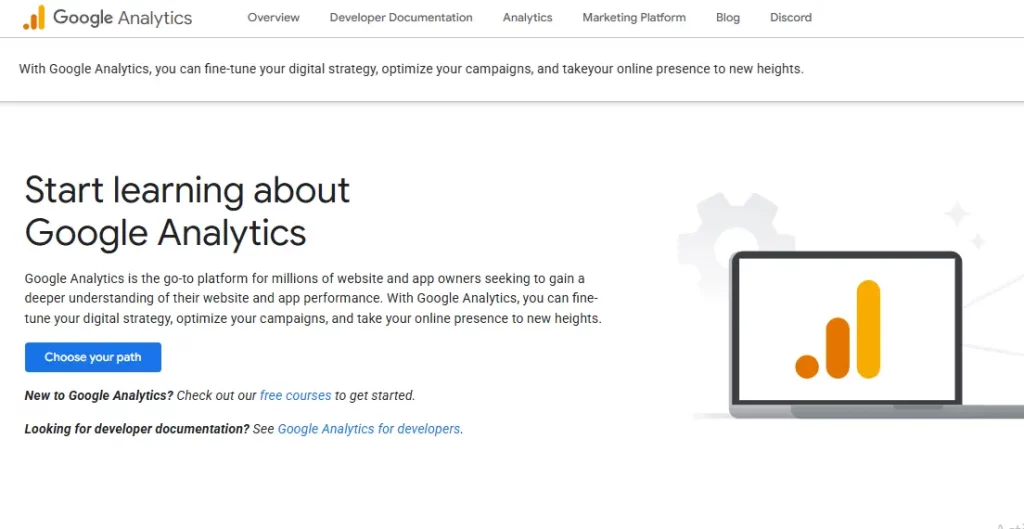
Google Analytics is indispensable for understanding user behavior on your site. By analyzing how visitors interact with your website, you can identify areas where you may need to improve security (e.g., high bounce rates on unsecured pages). It also helps you track your SEO performance and refine your strategy accordingly.
5. Cloudflare

Cloudflare offers a content delivery network (CDN) and a web application firewall (WAF), which are both essential for cybersecurity and SEO. Cloudflare helps prevent DDoS attacks, reduces downtime, and speeds up website performance. Faster loading times improve user experience and contribute positively to SEO rankings.
6. Sucuri
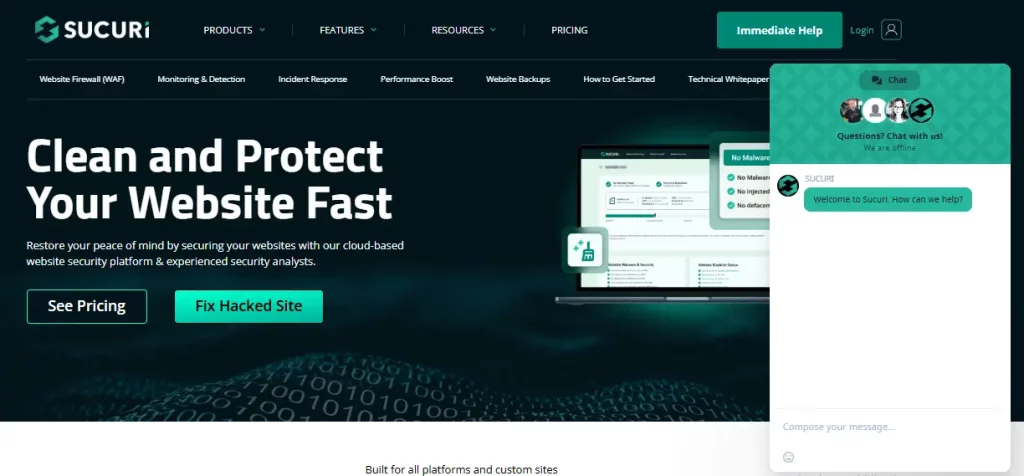
Sucuri provides website security services that include malware removal, hacking prevention, and security monitoring. By using Sucuri, you can protect your website from threats that could harm both its security and SEO performance. It also helps you recover from security breaches, ensuring that your website’s SEO rankings don’t suffer long-term damage.
Maximizing the Impact of Cyber Security SEO Tools
Implementing the right tools is just the beginning. Continuous monitoring and adapting to evolving cybersecurity threats and SEO trends are key to a successful strategy. Regular audits of your website’s security and SEO ensure you stay ahead of potential risks while providing the best user experience. By consistently using tools like SEMrush and Cloudflare, businesses can enhance both security and SEO, improving rankings and building trust with visitors.
Conclusion
In 2025, Cyber Security SEO is essential for cybersecurity firms to build trust, authority, and visibility. By integrating security practices with SEO, you not only protect your website but also enhance its search engine ranking. While challenges like balancing security and user experience exist, adopting the right strategies and tools will position your business for long-term success. Ultimately, Cyber Security SEO ensures a secure, high-performing website that stands out in the competitive digital landscape.
FAQs
Why is cybersecurity important for SEO?
Cybersecurity is crucial for SEO because a compromised website can face Google penalties, loss of rankings, and user distrust, negatively affecting search performance and traffic.
How do Google penalties impact a website’s SEO rankings?
Google penalties for malware or harmful content can reduce visibility, lead to traffic drops, and harm rankings. Cyber Security SEO helps avoid these penalties and maintain SEO health.
How can I protect my website from SEO spam attacks?
Use tools like Google’s Disavow Tool to remove harmful backlinks, scan for malware regularly, and monitor suspicious activity with SEO tools to protect against SEO spam attacks.
What are the best practices for Cyber Security SEO?
Best practices include using HTTPS, scanning for malware, protecting against harmful backlinks, enabling two-factor authentication, backing up your site, and improving site performance.
Can cybersecurity improve my website’s SEO rankings?
Yes, secure websites are trusted by Google, improving rankings. Security measures prevent penalties, boosting SEO and enhancing user trust.
How can I recover from a cyber attack that hurt my SEO rankings?
To recover, remove malware, secure your site with an SSL certificate and WAF, disavow harmful backlinks, and submit a reconsideration request to Google to lift penalties.
Author

We are a digital marketing agency with over 17 years of experience and a proven track record of helping businesses succeed. Our expertise spans businesses of all sizes, enabling them to grow their online presence and connect with new customers effectively. In addition to offering services like consulting, SEO, social media marketing, web design, and web development, we pride ourselves on conducting thorough research on top companies and various industries. We compile this research into actionable insights and share it with our readers, providing valuable information in one convenient place rather than requiring them to visit multiple websites. As a team of passionate and experienced digital marketers, we are committed to helping businesses thrive and empowering our readers with knowledge and strategies for success.
View all posts

